A Case Study on Internet Intermediary Liability in Defamation Law
VerifiedAdded on 2023/06/03
|6
|1474
|357
Case Study
AI Summary
This case study delves into the complex issue of internet intermediary liability for defamatory content posted by third parties, examining how courts have struggled to apply common law principles to this modern problem. It reviews key cases from various countries, including the United States, United Kingdom, Australia, Hong Kong, New Zealand, and Canada, highlighting the different approaches taken in each jurisdiction. The analysis covers concepts such as 'publication by omission,' 'innocent dissemination,' and the role of intention and knowledge in determining liability. Furthermore, the study discusses relevant statutes like the Communication Decency Act in the US, the Defamation Acts of the UK, and the EU Electronic Commerce Regulations, evaluating their effectiveness in addressing defamation issues involving internet intermediaries. The study concludes by pointing out the existing confusions and difficulties in determining the extent of liability for internet service providers and the necessity of knowledge and active involvement for imposing such liability.
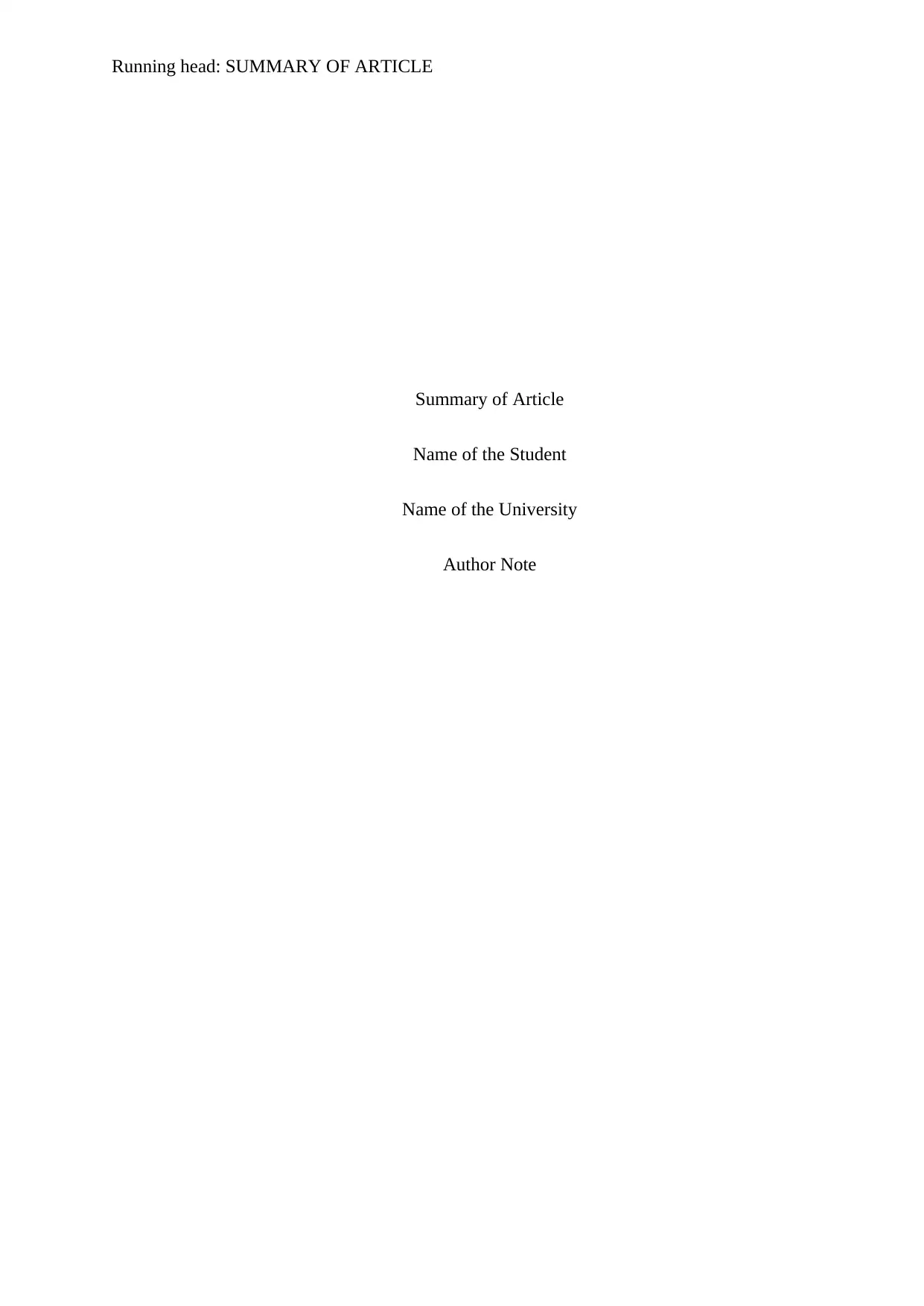
Running head: SUMMARY OF ARTICLE
Summary of Article
Name of the Student
Name of the University
Author Note
Summary of Article
Name of the Student
Name of the University
Author Note
Paraphrase This Document
Need a fresh take? Get an instant paraphrase of this document with our AI Paraphraser
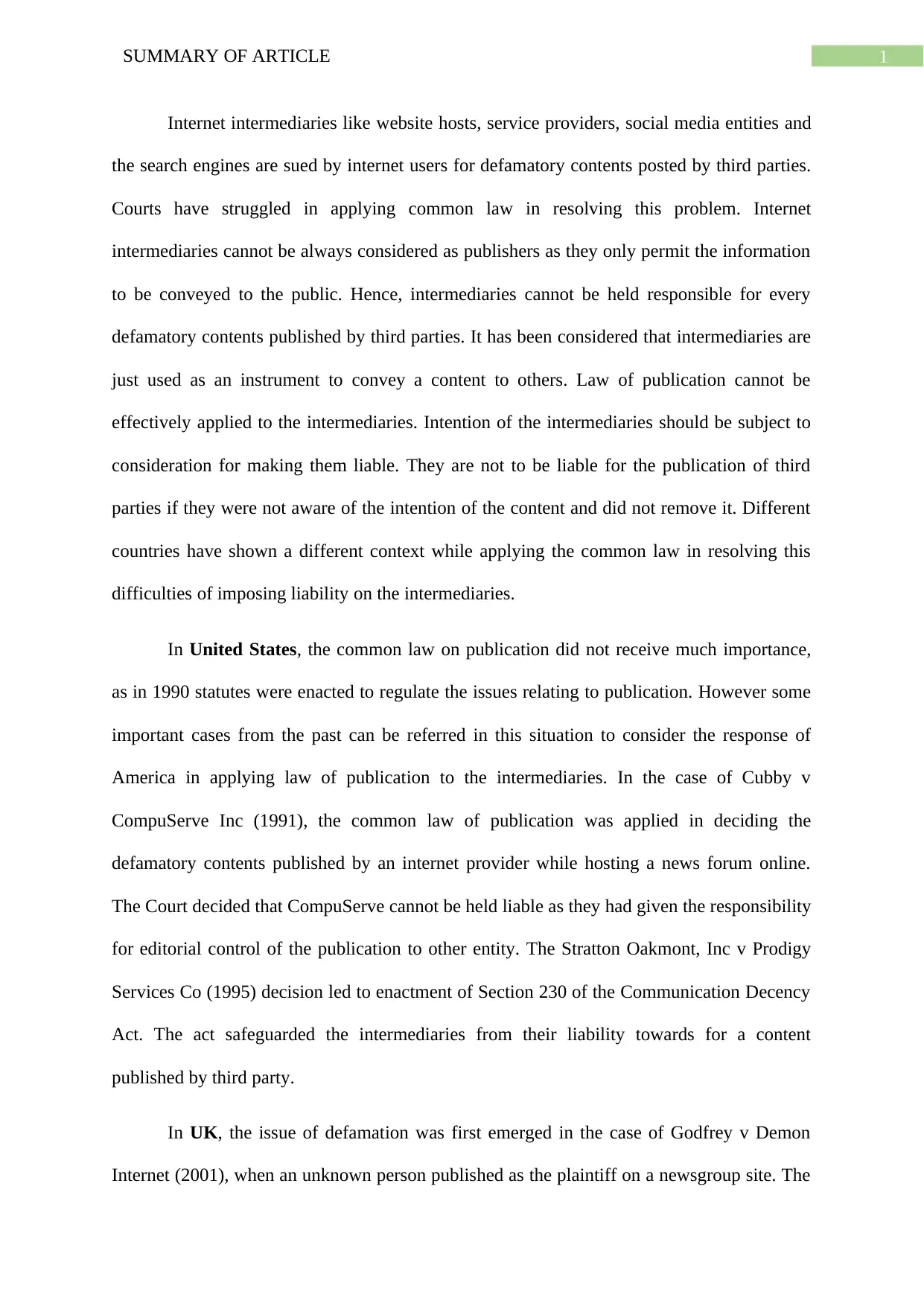
1SUMMARY OF ARTICLE
Internet intermediaries like website hosts, service providers, social media entities and
the search engines are sued by internet users for defamatory contents posted by third parties.
Courts have struggled in applying common law in resolving this problem. Internet
intermediaries cannot be always considered as publishers as they only permit the information
to be conveyed to the public. Hence, intermediaries cannot be held responsible for every
defamatory contents published by third parties. It has been considered that intermediaries are
just used as an instrument to convey a content to others. Law of publication cannot be
effectively applied to the intermediaries. Intention of the intermediaries should be subject to
consideration for making them liable. They are not to be liable for the publication of third
parties if they were not aware of the intention of the content and did not remove it. Different
countries have shown a different context while applying the common law in resolving this
difficulties of imposing liability on the intermediaries.
In United States, the common law on publication did not receive much importance,
as in 1990 statutes were enacted to regulate the issues relating to publication. However some
important cases from the past can be referred in this situation to consider the response of
America in applying law of publication to the intermediaries. In the case of Cubby v
CompuServe Inc (1991), the common law of publication was applied in deciding the
defamatory contents published by an internet provider while hosting a news forum online.
The Court decided that CompuServe cannot be held liable as they had given the responsibility
for editorial control of the publication to other entity. The Stratton Oakmont, Inc v Prodigy
Services Co (1995) decision led to enactment of Section 230 of the Communication Decency
Act. The act safeguarded the intermediaries from their liability towards for a content
published by third party.
In UK, the issue of defamation was first emerged in the case of Godfrey v Demon
Internet (2001), when an unknown person published as the plaintiff on a newsgroup site. The
Internet intermediaries like website hosts, service providers, social media entities and
the search engines are sued by internet users for defamatory contents posted by third parties.
Courts have struggled in applying common law in resolving this problem. Internet
intermediaries cannot be always considered as publishers as they only permit the information
to be conveyed to the public. Hence, intermediaries cannot be held responsible for every
defamatory contents published by third parties. It has been considered that intermediaries are
just used as an instrument to convey a content to others. Law of publication cannot be
effectively applied to the intermediaries. Intention of the intermediaries should be subject to
consideration for making them liable. They are not to be liable for the publication of third
parties if they were not aware of the intention of the content and did not remove it. Different
countries have shown a different context while applying the common law in resolving this
difficulties of imposing liability on the intermediaries.
In United States, the common law on publication did not receive much importance,
as in 1990 statutes were enacted to regulate the issues relating to publication. However some
important cases from the past can be referred in this situation to consider the response of
America in applying law of publication to the intermediaries. In the case of Cubby v
CompuServe Inc (1991), the common law of publication was applied in deciding the
defamatory contents published by an internet provider while hosting a news forum online.
The Court decided that CompuServe cannot be held liable as they had given the responsibility
for editorial control of the publication to other entity. The Stratton Oakmont, Inc v Prodigy
Services Co (1995) decision led to enactment of Section 230 of the Communication Decency
Act. The act safeguarded the intermediaries from their liability towards for a content
published by third party.
In UK, the issue of defamation was first emerged in the case of Godfrey v Demon
Internet (2001), when an unknown person published as the plaintiff on a newsgroup site. The
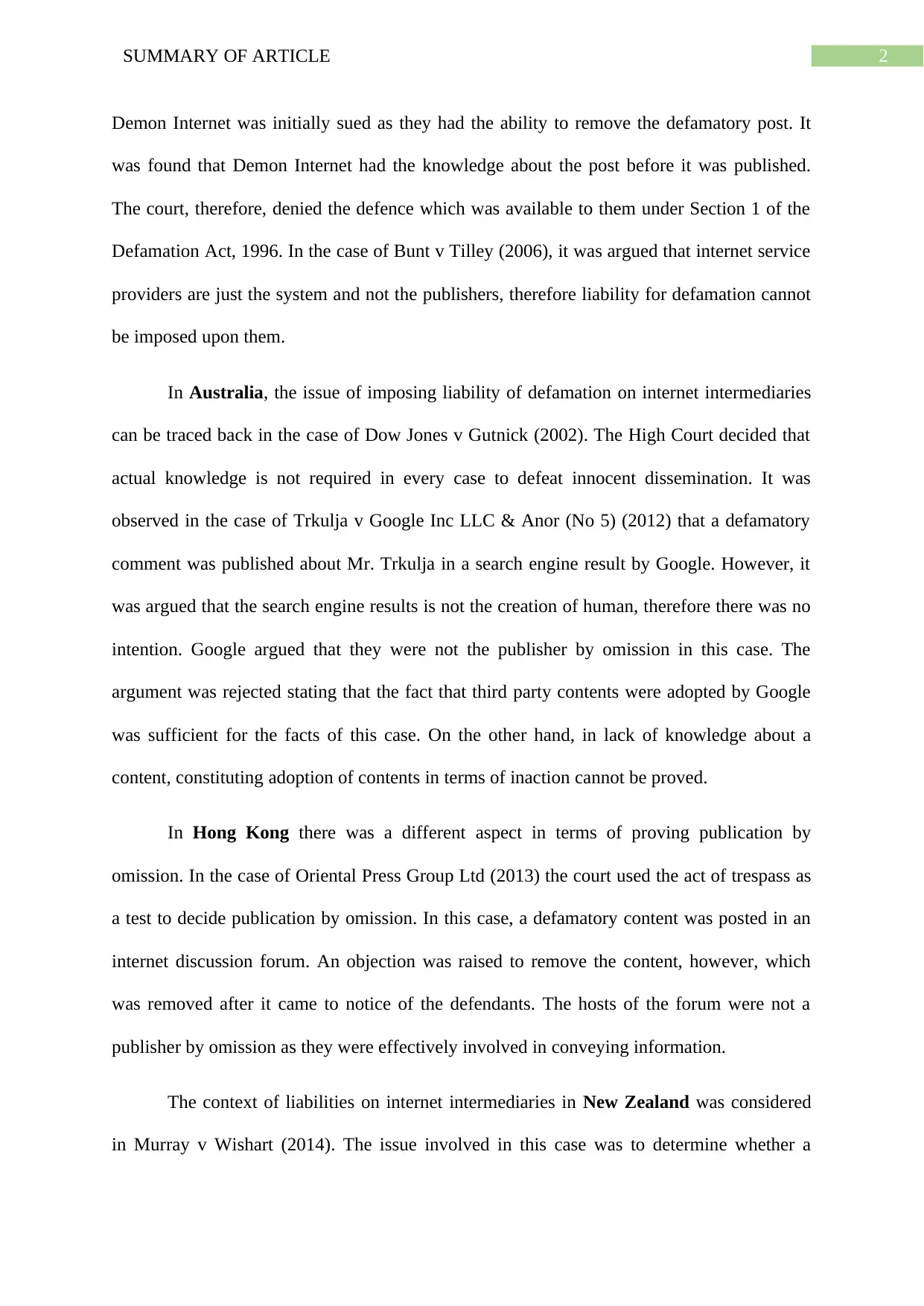
2SUMMARY OF ARTICLE
Demon Internet was initially sued as they had the ability to remove the defamatory post. It
was found that Demon Internet had the knowledge about the post before it was published.
The court, therefore, denied the defence which was available to them under Section 1 of the
Defamation Act, 1996. In the case of Bunt v Tilley (2006), it was argued that internet service
providers are just the system and not the publishers, therefore liability for defamation cannot
be imposed upon them.
In Australia, the issue of imposing liability of defamation on internet intermediaries
can be traced back in the case of Dow Jones v Gutnick (2002). The High Court decided that
actual knowledge is not required in every case to defeat innocent dissemination. It was
observed in the case of Trkulja v Google Inc LLC & Anor (No 5) (2012) that a defamatory
comment was published about Mr. Trkulja in a search engine result by Google. However, it
was argued that the search engine results is not the creation of human, therefore there was no
intention. Google argued that they were not the publisher by omission in this case. The
argument was rejected stating that the fact that third party contents were adopted by Google
was sufficient for the facts of this case. On the other hand, in lack of knowledge about a
content, constituting adoption of contents in terms of inaction cannot be proved.
In Hong Kong there was a different aspect in terms of proving publication by
omission. In the case of Oriental Press Group Ltd (2013) the court used the act of trespass as
a test to decide publication by omission. In this case, a defamatory content was posted in an
internet discussion forum. An objection was raised to remove the content, however, which
was removed after it came to notice of the defendants. The hosts of the forum were not a
publisher by omission as they were effectively involved in conveying information.
The context of liabilities on internet intermediaries in New Zealand was considered
in Murray v Wishart (2014). The issue involved in this case was to determine whether a
Demon Internet was initially sued as they had the ability to remove the defamatory post. It
was found that Demon Internet had the knowledge about the post before it was published.
The court, therefore, denied the defence which was available to them under Section 1 of the
Defamation Act, 1996. In the case of Bunt v Tilley (2006), it was argued that internet service
providers are just the system and not the publishers, therefore liability for defamation cannot
be imposed upon them.
In Australia, the issue of imposing liability of defamation on internet intermediaries
can be traced back in the case of Dow Jones v Gutnick (2002). The High Court decided that
actual knowledge is not required in every case to defeat innocent dissemination. It was
observed in the case of Trkulja v Google Inc LLC & Anor (No 5) (2012) that a defamatory
comment was published about Mr. Trkulja in a search engine result by Google. However, it
was argued that the search engine results is not the creation of human, therefore there was no
intention. Google argued that they were not the publisher by omission in this case. The
argument was rejected stating that the fact that third party contents were adopted by Google
was sufficient for the facts of this case. On the other hand, in lack of knowledge about a
content, constituting adoption of contents in terms of inaction cannot be proved.
In Hong Kong there was a different aspect in terms of proving publication by
omission. In the case of Oriental Press Group Ltd (2013) the court used the act of trespass as
a test to decide publication by omission. In this case, a defamatory content was posted in an
internet discussion forum. An objection was raised to remove the content, however, which
was removed after it came to notice of the defendants. The hosts of the forum were not a
publisher by omission as they were effectively involved in conveying information.
The context of liabilities on internet intermediaries in New Zealand was considered
in Murray v Wishart (2014). The issue involved in this case was to determine whether a
⊘ This is a preview!⊘
Do you want full access?
Subscribe today to unlock all pages.

Trusted by 1+ million students worldwide
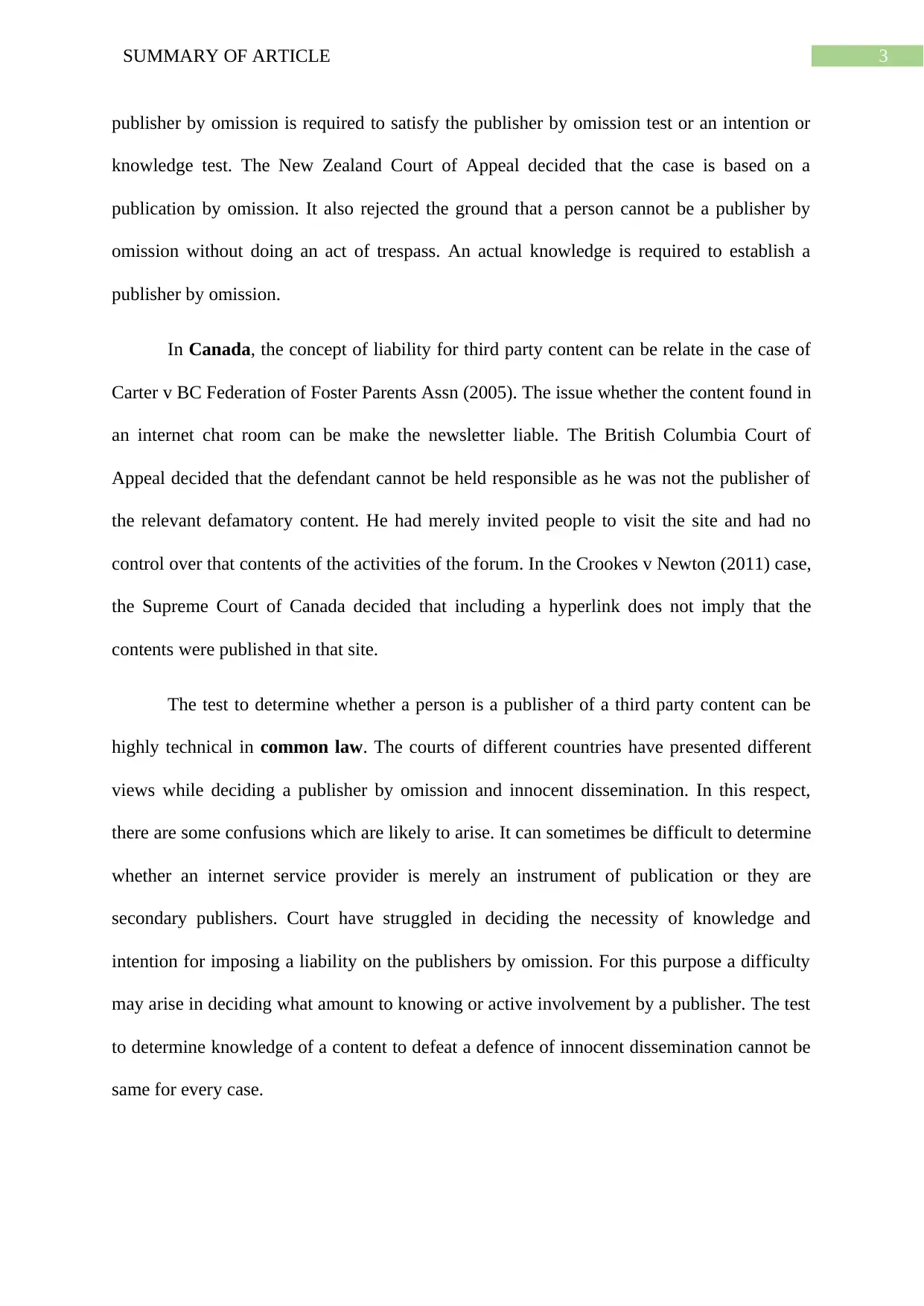
3SUMMARY OF ARTICLE
publisher by omission is required to satisfy the publisher by omission test or an intention or
knowledge test. The New Zealand Court of Appeal decided that the case is based on a
publication by omission. It also rejected the ground that a person cannot be a publisher by
omission without doing an act of trespass. An actual knowledge is required to establish a
publisher by omission.
In Canada, the concept of liability for third party content can be relate in the case of
Carter v BC Federation of Foster Parents Assn (2005). The issue whether the content found in
an internet chat room can be make the newsletter liable. The British Columbia Court of
Appeal decided that the defendant cannot be held responsible as he was not the publisher of
the relevant defamatory content. He had merely invited people to visit the site and had no
control over that contents of the activities of the forum. In the Crookes v Newton (2011) case,
the Supreme Court of Canada decided that including a hyperlink does not imply that the
contents were published in that site.
The test to determine whether a person is a publisher of a third party content can be
highly technical in common law. The courts of different countries have presented different
views while deciding a publisher by omission and innocent dissemination. In this respect,
there are some confusions which are likely to arise. It can sometimes be difficult to determine
whether an internet service provider is merely an instrument of publication or they are
secondary publishers. Court have struggled in deciding the necessity of knowledge and
intention for imposing a liability on the publishers by omission. For this purpose a difficulty
may arise in deciding what amount to knowing or active involvement by a publisher. The test
to determine knowledge of a content to defeat a defence of innocent dissemination cannot be
same for every case.
publisher by omission is required to satisfy the publisher by omission test or an intention or
knowledge test. The New Zealand Court of Appeal decided that the case is based on a
publication by omission. It also rejected the ground that a person cannot be a publisher by
omission without doing an act of trespass. An actual knowledge is required to establish a
publisher by omission.
In Canada, the concept of liability for third party content can be relate in the case of
Carter v BC Federation of Foster Parents Assn (2005). The issue whether the content found in
an internet chat room can be make the newsletter liable. The British Columbia Court of
Appeal decided that the defendant cannot be held responsible as he was not the publisher of
the relevant defamatory content. He had merely invited people to visit the site and had no
control over that contents of the activities of the forum. In the Crookes v Newton (2011) case,
the Supreme Court of Canada decided that including a hyperlink does not imply that the
contents were published in that site.
The test to determine whether a person is a publisher of a third party content can be
highly technical in common law. The courts of different countries have presented different
views while deciding a publisher by omission and innocent dissemination. In this respect,
there are some confusions which are likely to arise. It can sometimes be difficult to determine
whether an internet service provider is merely an instrument of publication or they are
secondary publishers. Court have struggled in deciding the necessity of knowledge and
intention for imposing a liability on the publishers by omission. For this purpose a difficulty
may arise in deciding what amount to knowing or active involvement by a publisher. The test
to determine knowledge of a content to defeat a defence of innocent dissemination cannot be
same for every case.
Paraphrase This Document
Need a fresh take? Get an instant paraphrase of this document with our AI Paraphraser
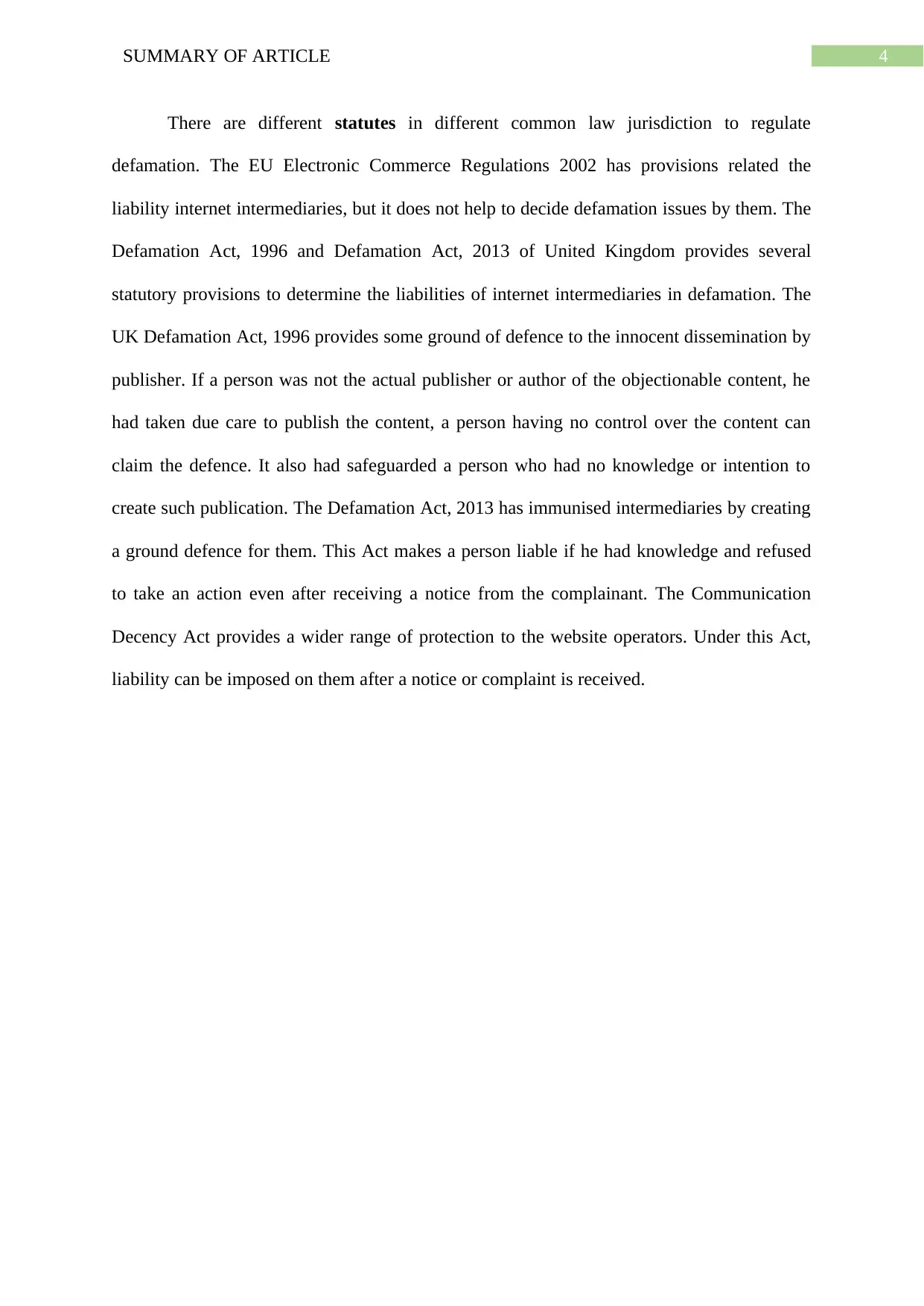
4SUMMARY OF ARTICLE
There are different statutes in different common law jurisdiction to regulate
defamation. The EU Electronic Commerce Regulations 2002 has provisions related the
liability internet intermediaries, but it does not help to decide defamation issues by them. The
Defamation Act, 1996 and Defamation Act, 2013 of United Kingdom provides several
statutory provisions to determine the liabilities of internet intermediaries in defamation. The
UK Defamation Act, 1996 provides some ground of defence to the innocent dissemination by
publisher. If a person was not the actual publisher or author of the objectionable content, he
had taken due care to publish the content, a person having no control over the content can
claim the defence. It also had safeguarded a person who had no knowledge or intention to
create such publication. The Defamation Act, 2013 has immunised intermediaries by creating
a ground defence for them. This Act makes a person liable if he had knowledge and refused
to take an action even after receiving a notice from the complainant. The Communication
Decency Act provides a wider range of protection to the website operators. Under this Act,
liability can be imposed on them after a notice or complaint is received.
There are different statutes in different common law jurisdiction to regulate
defamation. The EU Electronic Commerce Regulations 2002 has provisions related the
liability internet intermediaries, but it does not help to decide defamation issues by them. The
Defamation Act, 1996 and Defamation Act, 2013 of United Kingdom provides several
statutory provisions to determine the liabilities of internet intermediaries in defamation. The
UK Defamation Act, 1996 provides some ground of defence to the innocent dissemination by
publisher. If a person was not the actual publisher or author of the objectionable content, he
had taken due care to publish the content, a person having no control over the content can
claim the defence. It also had safeguarded a person who had no knowledge or intention to
create such publication. The Defamation Act, 2013 has immunised intermediaries by creating
a ground defence for them. This Act makes a person liable if he had knowledge and refused
to take an action even after receiving a notice from the complainant. The Communication
Decency Act provides a wider range of protection to the website operators. Under this Act,
liability can be imposed on them after a notice or complaint is received.
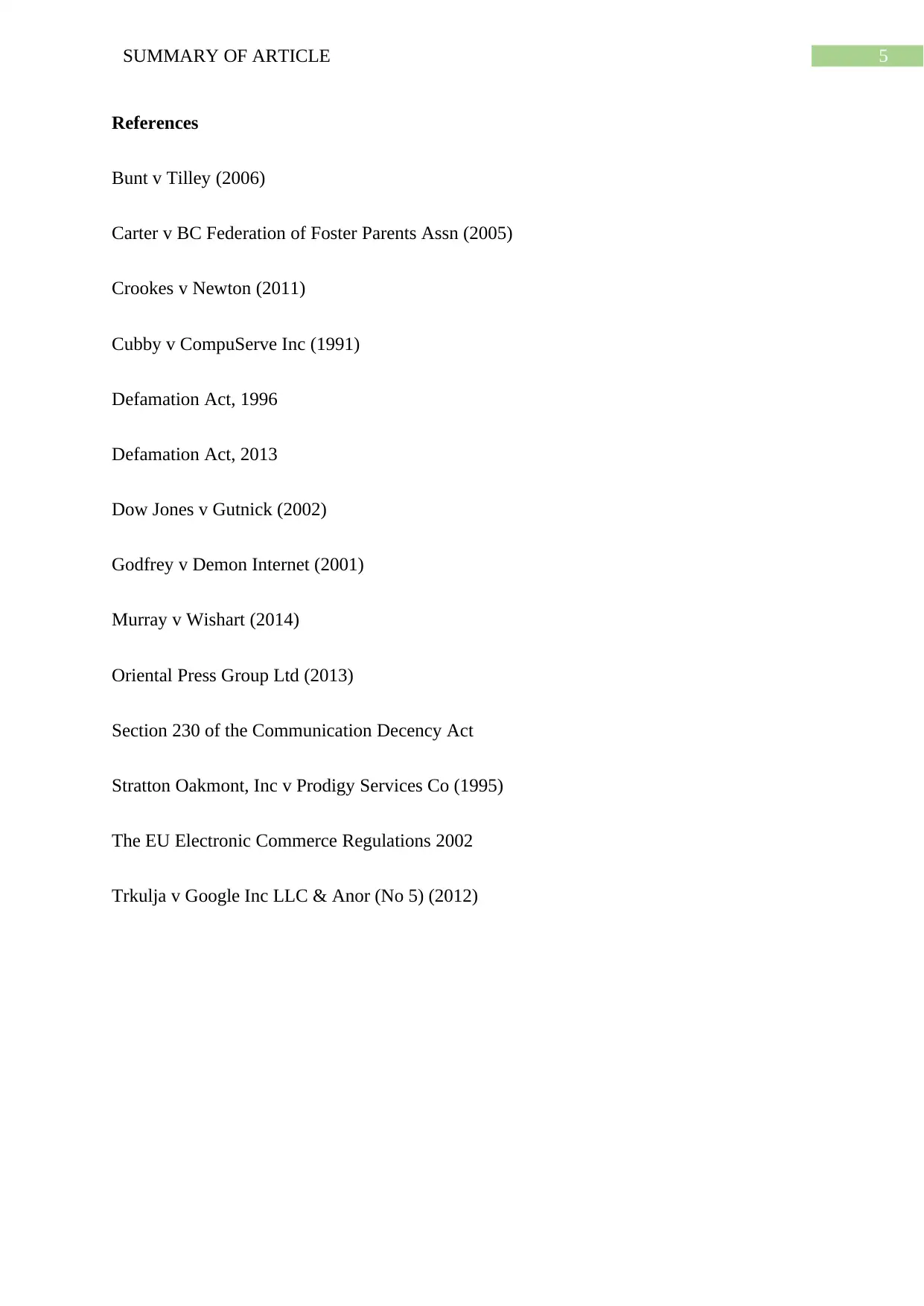
5SUMMARY OF ARTICLE
References
Bunt v Tilley (2006)
Carter v BC Federation of Foster Parents Assn (2005)
Crookes v Newton (2011)
Cubby v CompuServe Inc (1991)
Defamation Act, 1996
Defamation Act, 2013
Dow Jones v Gutnick (2002)
Godfrey v Demon Internet (2001)
Murray v Wishart (2014)
Oriental Press Group Ltd (2013)
Section 230 of the Communication Decency Act
Stratton Oakmont, Inc v Prodigy Services Co (1995)
The EU Electronic Commerce Regulations 2002
Trkulja v Google Inc LLC & Anor (No 5) (2012)
References
Bunt v Tilley (2006)
Carter v BC Federation of Foster Parents Assn (2005)
Crookes v Newton (2011)
Cubby v CompuServe Inc (1991)
Defamation Act, 1996
Defamation Act, 2013
Dow Jones v Gutnick (2002)
Godfrey v Demon Internet (2001)
Murray v Wishart (2014)
Oriental Press Group Ltd (2013)
Section 230 of the Communication Decency Act
Stratton Oakmont, Inc v Prodigy Services Co (1995)
The EU Electronic Commerce Regulations 2002
Trkulja v Google Inc LLC & Anor (No 5) (2012)
⊘ This is a preview!⊘
Do you want full access?
Subscribe today to unlock all pages.

Trusted by 1+ million students worldwide
1 out of 6
Related Documents
Your All-in-One AI-Powered Toolkit for Academic Success.
+13062052269
info@desklib.com
Available 24*7 on WhatsApp / Email
![[object Object]](/_next/static/media/star-bottom.7253800d.svg)
Unlock your academic potential
Copyright © 2020–2026 A2Z Services. All Rights Reserved. Developed and managed by ZUCOL.





